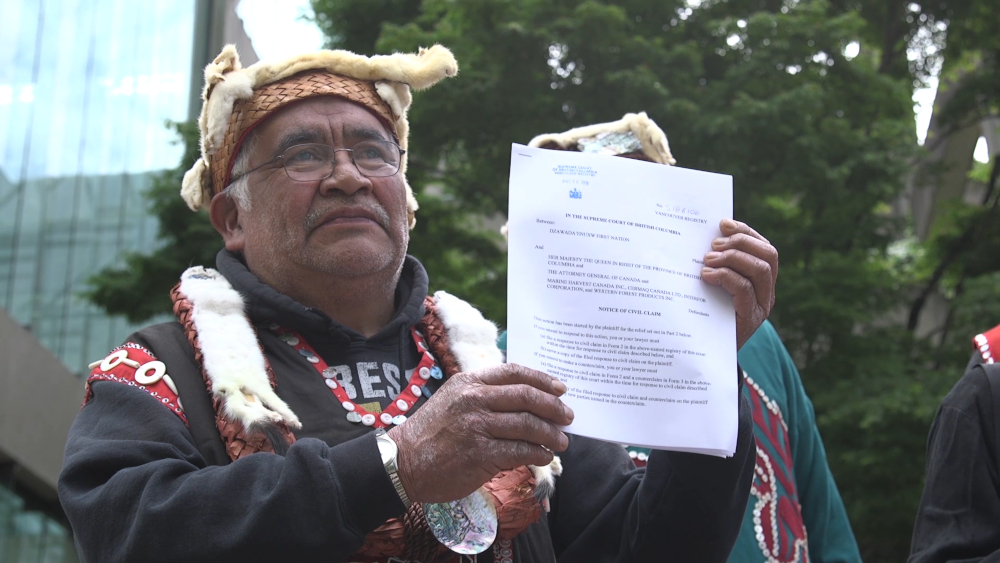The Dzawada’enuxw First Nation is suing the federal government for granting nine fish farm licences in its territory without the nation’s consent.
According to the Federal Court lawsuit, the granting of licences to Cermaq and Marine Harvest encroached upon Aboriginal rights by threatening wild eulachon and salmon populations, traditional staples for the First Nations.
“It is a very simple, uncluttered case,” Jack Woodward, lawyer for the nation, told The Tyee. “If we can prove fishing is an aboriginal right and that fish farms have infringed on these rights, then federal licences allowing fish farms should fall.”
The lawsuit argues that the fish farm licences have exposed wild salmon and eulachon (a smelt-like species that provides essential oils and grease) to higher levels of sea lice and viral diseases, including piscine orthoreovirus (PRV), a disease of farmed Atlantic salmon.
“Furthermore, there is a credible body of scientific evidence indicating a direct link between PRV and heart and skeletal muscle inflammation (HSMI). Both PRV and HSMI are known to have deleterious effects on fish,” says the lawsuit.
“This fight is not only for my nation but all people of B.C. who live up and down the coast and love salmon,” said former elected chief Willie Moon in a Tyee interview.
In 2012 the Dzawada’enuxw First Nation delivered a petition signed by 11,000 people telling then-premier Christy Clark not to renew open-net fish farms in their territory.
In 2016 they served eviction notices and boarded two fish farms in their territories and were ignored again.
Last month the provincial government announced a plan to phase out some fish farms in the Broughton Archipelago. The agreement did not include the Dzawada’enuxw First Nation.
“Over the years we’ve learned how governments will say one thing and then do something completely different,” said Moon. “For us the lawsuit will provide us with a guarantee about what will happen in our territory.”
The Dzawada’enuxw First Nation was among the first to make contact with Europeans and were studied by famed anthropologist Franz Boas.
During the attempted conquest they were not moved off their territory by colonial governments or forced to amalgamate with other nations.
Elected and hereditary chiefs are united in their opposition to fish farms because of the impact on wild fish populations.
“The federal government should have come to us and said this is what we are proposing with fish farms,” explained Moon. “They neglected to do that. As a result they hold a big responsibility for what is happening in our territories.”
Woodward, a Campbell River lawyer representing the First Nation, said his clients now have three outstanding legal challenges to the fish farm industry and the way it has invaded territory.
One launched against the province last year claims that provincial fish farm tenures infringe upon aboriginal title.
A second is seeking a court injunction that would prevent Marine Harvest and Cermaq from applying to renew other provincial licences in their territory.
And the third is the federal challenge.
“A win on any one of these cases would end fish farm licences for Atlantic salmon on the coast,” said Woodward.
“The province is the landlord. But the real culprit is the federal government which issues licences to allow Atlantic salmon in Pacific waters.”
In 2018 Julie Gelfand, the federal commissioner of the environment and sustainable development, concluded the federal government wasn’t protecting wild salmon.
Gelfand found that “Fisheries and Oceans Canada did not adequately manage the risks associated with salmon aquaculture consistent with its mandate to protect wild fish.” ![]()
Read more: Indigenous, Politics

















Tyee Commenting Guidelines
Comments that violate guidelines risk being deleted, and violations may result in a temporary or permanent user ban. Maintain the spirit of good conversation to stay in the discussion.
*Please note The Tyee is not a forum for spreading misinformation about COVID-19, denying its existence or minimizing its risk to public health.
Do:
Do not: